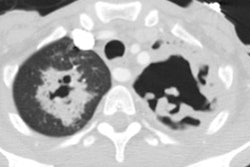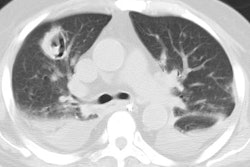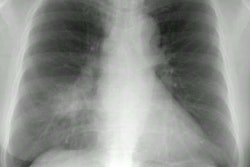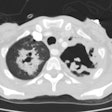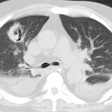Pulmonary tuberculosis in AIDS patients: transient chest radiographic worsening after initiation of antiretroviral therapy.
Fishman JE, Saraf-Lavi E, Narita M, Hollender ES, Ramsinghani R, Ashkin D
Department of Radiology, University of Miami School of Medicine, Jackson Memorial Hospital, FL 33136, USA.
OBJECTIVE: Immune function and inflammatory responses often increase
in AIDS patients who receive antiretroviral therapy. We evaluated the occurrence
and nature of transient worsening on chest radiographs in AIDS patients
with tuberculosis after initiation of antiretroviral therapy and compared
these findings with chest radiographs of patients undergoing antituberculous
therapy alone. MATERIALS AND METHODS: A retrospective review of sequential
chest radiographs was performed of 87 patients undergoing therapy for pulmonary
tuberculosis: AIDS patients receiving antiretroviral therapy (n = 31),
HIV-positive patients not receiving
antiretroviral therapy (n = 26), and HIV-negative patients (n
= 30). Pulmonary consolidations, thoracic lymphadenopathy, and pleural
effusions were evaluated for worsening, stability, or improvement. Patients
with concurrent pulmonary infections were excluded. RESULTS: Transient
worsening on radiography was observed in 14 (45%) of 31 AIDS patients receiving
antiretroviral therapy, including seven patients (23%) who showed severe
worsening. Of 56 patients in the other two groups, 11 (20%) showed worsening
(p = 0.023), two of whom showed severe worsening (p = 0.009). Worsening
was first noted between 1 and 5 weeks after initiation of antiretroviral
therapy, with improvement occurring between 2 weeks and 3 months later.
Four patients with severe worsening converted their tuberculin purified
protein derivative responses from anergic to positive after antiretroviral
treatment. CONCLUSION: Transient worsening is frequently seen on chest
radiography in AIDS patients with tuberculosis who subsequently undergo
antiretroviral therapy. This phenomenon may be related to improved immune
function.
